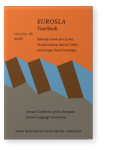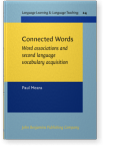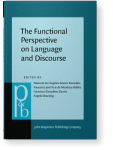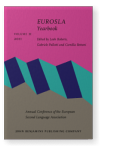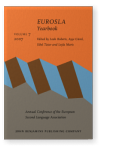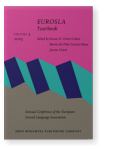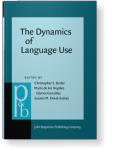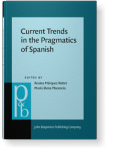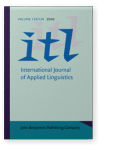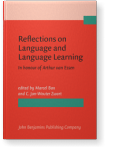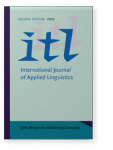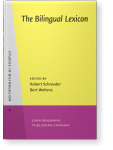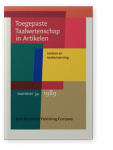Paul Meara
List of John Benjamins publications for which Paul Meara plays a role.
Yearbook
Title
Connected Words: Word associations and second language vocabulary acquisition
Paul Meara
[Language Learning & Language Teaching, 24] 2009. xvii, 174 pp.
Subjects Applied linguistics | Language acquisition | Psycholinguistics
2016 Testing aptitude: Investigating Meara’s (2005) LLAMA tests EUROSLA Yearbook: Volume 16 (2016), Liszka, Sarah Ann, Pascale Leclercq, Marion Tellier and Georges Daniel Véronique (eds.), pp. 179–210 | Article
Meara (2005) developed the LLAMA tests as a free, language-neutral, user-friendly suite of aptitude tests incorporating four separate elements: vocabulary learning (LLAMA_B), phonetic (implicit) memory (LLAMA_D), sound-symbol correspondence (LLAMA_E) and grammatical inferencing (LLAMA_F) based on… read more
2014 Life before Nation: Bibliometrics and L2 vocabulary studies in 1982 The Functional Perspective on Language and Discourse: Applications and implications, Gómez González, María de los Ángeles, Francisco José Ruiz de Mendoza Ibáñez, Francisco Gonzálvez-García and Angela Downing (eds.), pp. 111–130 | Article
This paper presents a bibliometric analysis comparing the research on L2
vocabulary acquisition published in 1982 and 2006. A set of co-citation maps
shows that there are some significant changes in the field over this period. The
most important of these changes is a growing consensus in vocabulary… read more
2011 Gossamer or bindweed? Association links between common words EUROSLA Yearbook: Volume 11 (2011), Roberts, Leah, Gabriele Pallotti and Camilla Bettoni (eds.), pp. 94–114 | Article
This paper reports a single-subject study of word associations in English. The work uses an innovative research methodology which makes it possible to examine very large numbers of associations. From this we can make some reasonably reliable estimates about the global and local structure of the… read more
2007 Growing a vocabulary EUROSLA Yearbook: Volume 7 (2007), Roberts, Leah, Ayşe Gürel, Sibel Tatar and Leyla Martı (eds.), pp. 49–65 | Article
This paper describes how simple Boolean Network models can be adapted to explore the way a vocabulary network might grow. The models described have two main parameters — a New Word parameter, which determines the rate at which new words are added to the lexicon, and an independent New Link… read more
2005 Reactivating a dormant vocabulary EUROSLA Yearbook: Volume 5 (2005), Foster-Cohen, Susan H., María del Pilar García Mayo and Jasone Cenoz (eds.), pp. 269–280 | Article
This paper describes an attempt to elicit examples of spontaneous vocabulary reactivation as a result of a short period of intensive exposure to an L2 environment. The data collected suggests that extensive reactivation may take place under these conditions, but it is largely driven by words that… read more
2005 Designing vocabulary tests for English, Spanish and other languages The Dynamics of Language Use: Functional and contrastive perspectives, Butler, Christopher S., María de los Ángeles Gómez González and Susana M. Doval-Suárez (eds.), pp. 271–285 | Article
2004 5. Role-plays and the assessment of oral proficiency in Spanish Current Trends in the Pragmatics of Spanish, Márquez Reiter, Rosina and María Elena Placencia (eds.), pp. 79–98 | Chapter
2002 Lexical Signatures in Foreign Language Free-Form Texts ITL - International Journal of Applied Linguistics 135/136, pp. 85–96 | Article
Abstract This paper presents an investigation into the extent to which the lexical choices made by learners of a second language (L2) are distinctive. It follows on from an earlier paper by the same authors in which a neural network was successfully trained to mark a set of texts produced by L2… read more
2001 19. A methodology for evaluating the effectiveness of vocabulary treatments Reflections on Language and Language Learning: In honour of Arthur van Essen, Bax, Marcel and Jan-Wouter Zwart (eds.), pp. 267–278 | Chapter
1993 The Bilingual Lexicon and the Teaching of Vocabulary The Bilingual Lexicon, Schreuder, Robert and Bert Weltens (eds.), pp. 279–298 | Article
1989 Models of the Lexicon in English and Other Funny Languages Lexicon en taalverwerving, pp. 7–12 | Article
